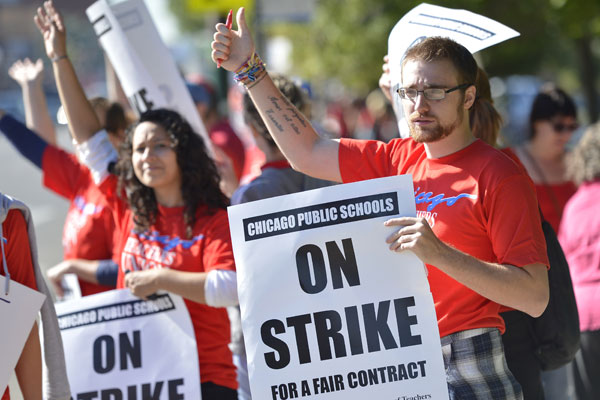By Elizabeth Grady
Promotions Editor
Chicago public school students began their first day of school Wednesday, seven days late.
A teacher’s strike in the third-largest school district in the U.S. prevented 405,000 students from returning to Chicago’s 675 schools, according to the Chicago Public School’s website.
Teachers picketed over an extended school day, job losses from school closings and evaluations tied to student performance, said a Sept. 18 CNN article.
Whatever the issues might have been, professional and union negotiations should never interrupt the ability of children to receive an education.
According to the CPS’s website, in 2012 the district achieved its highest graduation rate of 60.6 percent. This rate already seems low, with less than two-thirds of students receiving a diploma. With a marked, steady increase in a low graduation rate, this has to have an impact on the mentality of returning students, particularly high school students. If teachers can skip out on school, why can’t students?
With a graduation rate so low, it seems Chicago teachers already struggle to get students to attend school. If the teachers don’t want to teach, what precedent does that set for students?
Students received a punishment for something that was not their faults. Tax-paying parents became forced to unexpectedly juggle their school-aged children with their careers because teachers were angry with their bosses. The inability for teachers and administrators to communicate should not trickle down and impact parents and students so greatly. Teachers should have brainstormed a different way to strike if they felt it was a necessary way to demonstrate their complaints to administrators.
It seemed their complaints echoed many in the teaching world, with some exceptions. According to a Sept. 11 Fox News story, the teachers sought a 35-percent raise, when the administrators would only offer 16 percent.
Instead of holding students back from education, teachers could have made the decision as a union to not participate in the new evaluations tied to student performance or refused to attend regular meetings with administrators.
Walk out on the administrators, not the students. Punish the people who actually deserve it.
their complaints echoed many in the teaching world, with some exceptions. According to a Sept. 11 Fox News story, they sought a 35 percent raise, when administrators would only offer 16 percent.
Instead of holding students back from education, teachers could have made the decision as a union to not participate in the new evaluations tied to student performance, or refuse to attend regular meetings with administrators.
Walk out on the administrators, not the students. Punish the people who actually deserve it.







